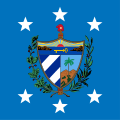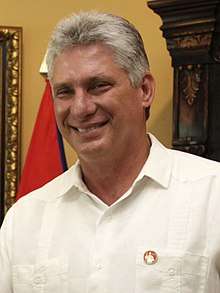President of Cuba
The president of Cuba (Spanish: Presidente de Cuba), officially the president of the Republic of Cuba (Spanish: Presidente de la República de Cuba), is the head of state of Cuba. The office in its current form was established under the Constitution of 2019. The president is the second most powerful position, after the first secretary of the Communist Party of Cuba.[2] Miguel Díaz-Canel became president of the Council of State on 19 April 2018, taking over from Raúl Castro, and has been president of Cuba since 10 October 2019.
| President of the Republic of Cuba
Presidente de la República de Cuba | |
|---|---|
 | |
 Official Standard | |
| Council of State | |
| Style | Mr. President (Informal) His Excellency (In international correspondence) |
| Status | Head of state Head of government |
| Member of | Council of Ministers |
| Residence | Palacio de la Revolución |
| Appointer | National Assembly of People's Power |
| Term length | Five years, renewable once[1] |
| Inaugural holder | Tomás Estrada Palma |
| Formation | 12 April 1902 |
| Deputy | Vice President of Cuba |
| Website | https://www.presidencia.gob.cu/es/ |
 |
|---|
| This article is part of a series on the politics and government of Cuba |
|
|
Legislature |
|
Judiciary
|
|
Administrative divisions |
|
|
The position of first secretary of the Communist Party of Cuba continues to be the most powerful political position in Cuba. Fidel Castro held both positions from 1976 to 2008, and Raúl Castro held both positions from 2011 to 2018. Raúl Castro continues to hold the position of first secretary.
History
Under the 1901 constitution, Cuba had a presidential system based on that of the United States.
In 1940, a new constitution reformed the government into a semi-presidential system, 18 years before its modern archetype – the French Fifth Republic – came into being.
On 2 December 1976, the executive was reformed again by a new national constitution, this time in emulation of the Soviet Union. The presidential office was abolished and replaced by a collective head of state, the Council of State, elected by the National Assembly of People's Power. However, unlike the USSR's arrangements, where the chairmen of the Presidium of the Supreme Soviet and the Council of Ministers were distinct posts, the chairman of the Council of State also chaired the Council of Ministers. Furthermore, unlike English and Russian, Spanish does not distinguish between the terms "chairman/председатель" and "president/президент", translating both as "presidente". Thus, when back-translated into English, the term used was not "Chairman" (on the precedent of similar institutions in countries whose languages have a chairman/president distinction, such as the USSR and East Germany), but rather "President", from the shared etymology with the Spanish "presidente".
On 24 February 2019, another constitution – Cuba's current – was adopted in a referendum. Under it, the government was again re-organized, and the posts of President and Prime Minister were restored. [3] This reorganization took effect on 11 October 2019. Díaz-Canel was President of the Council of State until 10 October 2019 and President of the Republic after that date. Under the new constitution, the position of President of the Council of State continues as a separate role, subordinate to President of the Republic.
In cases of the absence, illness or death of the President of Cuba, the vice president assumes the presidential duties.
Powers
The president of Cuba has the power to:
- Propose to the National Assembly of People’s Power, once elected by that body, the members of the Council of Ministers
- Accept (based on personal preference) the resignation of the members of the Council of Ministers or propose either to the National Assembly of People’s Power or the Council of State the replacement of any of those members and, in both cases, to propose the corresponding substitutes
- Receive the credentials of the heads of delegation of foreign diplomatic missions. This responsibility may be delegated to any of the vice presidents of the Council of State;
- Assume the supreme command of all armed forces and determine their general organization
- Preside over the National Defense Council
- Declare a state emergency in those cases provided for in this Constitution, stating his decision, as soon as the circumstances permit it, to the National Assembly of People’s Power or to the Council of State if the Assembly is unable to meet, according to legal effects
- Sign decree-laws and other resolutions of the Council of State and the legal provisions adopted by the Council of Ministers or its executive committee, and arrange for their publication in the Official Gazette of the Republic
- Assume all other duties assigned it by the Constitution or by law.
List of heads of state
See also
- First Secretary of the Communist Party of Cuba
- Prime Minister of Cuba
- List of prime ministers of Cuba
- Cuba under Fidel Castro
- 2006–08 Cuban transfer of presidential duties
References
- "Raul Castro says Cuba needs term limits for its leaders". Retrieved 2016-09-07.
- "Raul Castro to lead Cuba's Communist Party until 2021". FRANCE 24. 19 April 2018.
"I confirm to this assembly that Raul Castro, as first secretary of the Communist Party, will lead the decisions about the future of the country," Diaz-Canel said.
- Mimi Whitefield (February 25, 2019). "Cuba approves new constitution: What changes, what doesn't?". Miami Herald. Retrieved February 25, 2019.
